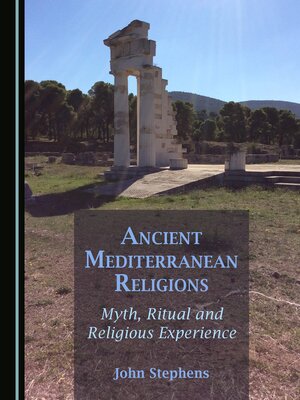
Sign up to save your library
With an OverDrive account, you can save your favorite libraries for at-a-glance information about availability. Find out more about OverDrive accounts.
Find this title in Libby, the library reading app by OverDrive.



Search for a digital library with this title
Title found at these libraries:
| Loading... |
This book offers a clear and concise historical overview of the major religious movements of the ancient Mediterranean world existing from the time of the second millennium BCE up until the fourth century CE, including both the Judeo-Christian and pagan religious traditions. Recognizing the significant role of religious institutions in human history and acknowledging the diversity of religious ideas and practices in the ancient Mediterranean world, "religion" is defined as a collection of myths, beliefs, rituals, ethical practices, social institutions and experiences related to the realm of the sacred cosmos. Without focusing too much attention on technicalities and complex vocabulary, the book provides an introductory road map for exploring the vast array of religious data permeating the ancient Mediterranean world. Through an examination of literary and archeological evidence, the book summarizes the fundamental religious beliefs and practices of the ancient Near Eastern world, including the religious traditions of ancient Mesopotamia, Egypt and Israel. Turning westward, the fascinating world of ancient Greek and Roman religion is considered next. The discussion begins with a description of Minoan-Mycenaean religion, followed by a consideration of classical Roman and Greek religion. Next, the numerous religious movements that blossomed during Hellenistic-Roman times are discussed. In addition, the fundamental theological contributions of various Greco-Roman philosophical schools of thought, including Orphism, Stoicism, Pythagoreanism, Platonism and Neo-Platonism, are described. Greco-Roman philosophy functioned as a quasi-religious outlook for many, and played a decisive role in the evolution of religion in the classical and Hellenistic period. The theological speculations of the philosophers regarding the nature of God and the soul made a huge impact in religious circles during the classical and Hellenistic era. Moving forward in history from archaic and classical times to the later Hellenistic-Roman period, the old religious order of the past falls by the wayside and a new updated religious paradigm begins to develop throughout the Mediterranean world, with a greater emphasis being placed upon the religious individual and the expression of personal religious feelings. There are several important social and historical reasons for this shift in perspective and these factors are explained in the chapter focusing upon personal religion in Hellenistic times. Since the entire religious topography of the ancient Mediterranean world is rarely outlined in a single volume, this book will be a welcome addition to anyone's library.






